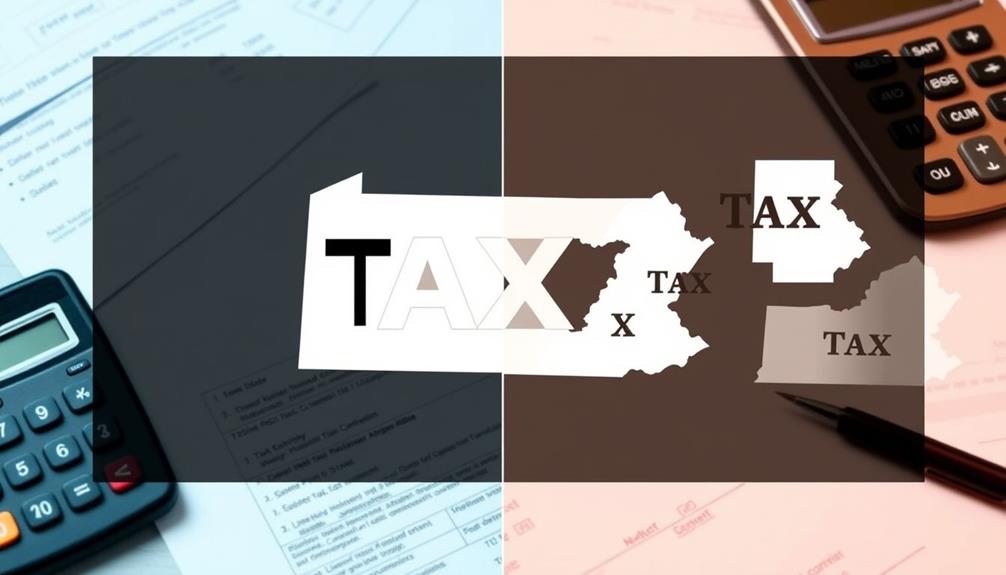When you withdraw money from your IRA in Pennsylvania, it is important to be aware of the tax implications. If you withdraw funds before reaching age 59 1/2, they will be subject to full taxation, regardless of whether you are retired or not. However, once you reach age 59 1/2, your withdrawals will be tax-free at the state level. Pennsylvania does not follow federal regulations that allow for exceptions on early withdrawals, meaning that any distributions exceeding previously taxed contributions will be subject to state income tax. It is advisable to seek guidance from a tax professional to help you navigate these regulations. If you are interested in how this compares to other states or need additional resources for assistance, there is a wealth of information available to help you better understand the process.
Key Takeaways
- IRA withdrawals before age 59 1/2 are subject to Pennsylvania state income tax, regardless of retiree status or payment method.
- After age 59 1/2, IRA withdrawals are tax-exempt at the state level in Pennsylvania.
- Pennsylvania does not recognize federal exceptions for early withdrawals, leading to unexpected tax consequences.
- Taxable amounts include distributions that exceed previously taxed contributions, affecting early withdrawal calculations.
- Consulting a tax professional is recommended for navigating Pennsylvania's specific tax laws regarding IRA withdrawals.
Overview of IRA Taxation in Pennsylvania

When considering IRA withdrawals in Pennsylvania, it's vital to understand how state taxation applies. In Pennsylvania, if you take an IRA withdrawal before reaching age 59 1/2, you'll find it subject to Pennsylvania income tax, regardless of your retiree's status.
These early withdrawals are taxable under state law, and this tax applies even if you distribute the funds in equal payments. Once you turn 59 1/2, however, your IRA withdrawals become tax-exempt at the state level, allowing you to access your retirement funds without additional state taxes.
It's important to recognize that Pennsylvania doesn't recognize federal exceptions for early withdrawals; all early distributions incur taxes. When calculating your taxable amount from an IRA withdrawal, remember that it includes any distributions exceeding previously taxed contributions, following the cost recovery method.
This means you should be aware of how much you've already paid taxes on to determine the proper taxable amount for your current withdrawals. Understanding these nuances of state law will help you manage your finances effectively as you navigate your retirement.
Early Withdrawal Tax Consequences

Withdrawing funds from your IRA before hitting age 59 1/2 can bring unexpected tax consequences in Pennsylvania. Unlike some other states, Pennsylvania doesn't recognize federal exceptions for early withdrawals. This means that regardless of your retirement status or any federal exemptions, early distributions will still incur Pennsylvania income tax.
The taxable amount includes any distributions that exceed contributions you've already taxed, so you need to be careful about what you withdraw. Even if you decide to take equal payments before age 59 1/2, those payments are still subject to PA income tax, adding to your financial burden.
To avoid unexpected tax liabilities, compliance with Pennsylvania tax laws is essential when planning for early withdrawals. You should always consult a tax professional to guarantee your IRA withdrawals align with state regulations.
Understanding these early withdrawal tax consequences can help you strategize your finances and minimize the impact on your overall tax situation. Stay informed about the implications of your decisions to make the most of your retirement savings while maneuvering state taxation effectively.
Comparison With Other States

Understanding tax implications on IRA withdrawals in Pennsylvania sets the stage for comparing how different states handle retirement income. Pennsylvania stands out favorably because it doesn't impose state taxes on IRA withdrawals, unlike New Jersey, which taxes pension income, including these distributions. This difference can greatly affect your net income during retirement.
States like Florida and Texas have no state income tax, which seems appealing. However, they may have other fees that could offset the benefits of tax-free retirement income.
On the other hand, states such as California and New York have higher state tax rates that apply to retirement income, which can be a burden for retirees.
Additionally, Pennsylvania exempts Social Security benefits from state taxation, whereas states like Connecticut still tax these benefits, impacting your overall retirement income strategy.
With a favorable tax environment, Pennsylvania offers considerable tax relief for retirees compared to many other states.
If you're considering where to retire, consulting a financial advisor can help you navigate these complexities and evaluate how state tax laws might affect your retirement income.
Ultimately, Pennsylvania's tax policies enhance its attractiveness for retirees.
Resources for Tax Assistance

Many valuable resources are available to help you navigate the tax implications of IRA withdrawals in Pennsylvania. The Pennsylvania Department of Revenue is a primary source for guidelines and tax forms related to your IRA distributions. On their website, you'll find online tools for filing inquiries, payment tracking, and determining your tax obligations. You can even use the "Where's my refund?" feature to get an update on your tax refund status.
Additionally, AARP Pennsylvania offers advocacy and community support, providing tax assistance programs specifically designed for older residents dealing with retirement income tax issues. Consulting with tax professionals is highly recommended to get personalized strategies addressing the specific tax implications of your IRA withdrawals.
Here's a quick overview of key resources:
| Resource | Description |
|---|---|
| Pennsylvania Department of Revenue | Guidelines and tax forms |
| AARP Pennsylvania | Tax assistance for older residents |
| Online Tools | Filing inquiries and payment tracking |
| Tax Professionals | Personalized tax strategies |
Future Tax Considerations

Retirees in Pennsylvania should stay alert to potential changes in tax laws that could impact their IRA withdrawals.
As legislative changes loom, the future tax implications of your retirement income may shift. Economic conditions and state budget needs can lead to adjustments in tax structures, altering how IRA withdrawals are taxed.
It's essential to understand that advocacy groups might push for reforms that could change the current tax friendliness of Pennsylvania regarding retirement income and distributions.
These potential changes could influence your financial planning strategies, making it vital to monitor state tax law updates consistently.
Frequently Asked Questions
Do You Pay State Tax on IRA Withdrawals in Pa?
Yes, you pay state tax on IRA withdrawals in Pennsylvania. Regardless of your age, all distributions are subject to state income tax, and early withdrawals face additional tax liabilities. Plan accordingly for your retirement income.
Do I Have to Pay State Taxes on an IRA Withdrawal?
Yes, you have to pay state taxes on an IRA withdrawal. Regardless of your age, the amount you withdraw is subject to state income tax, so plan accordingly to avoid unexpected tax liabilities.
Are IRA Contributions Taxable in Pa?
"Don't count your chickens before they hatch." In Pennsylvania, traditional IRA contributions are generally tax-deductible if you meet criteria, while Roth IRAs aren't deductible. Keep records for future tax benefits or liabilities.
What Is the Pennsylvania State Tax on a 401K Withdrawal?
When you withdraw from your 401(k) in Pennsylvania, you'll face a flat state tax rate of 3.07% if you're under 59 1/2. After that age, you won't owe state income tax.
Conclusion
As you navigate the winding river of IRA withdrawals in Pennsylvania, remember that each twist and turn holds hidden tax implications. Just like a seasoned traveler, staying informed will help you avoid the rocky shores of unexpected penalties and guarantee smooth sailing toward your financial goals. Embrace the knowledge you've gained, and let it guide you through the currents of taxation. With careful planning, you can chart a course toward a secure financial future.









